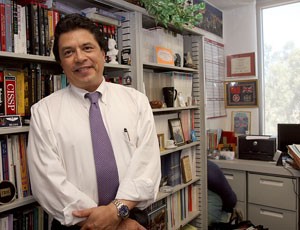Roberto Mejias, a management information systems professor at the Eller College of Management, earned his doctorate from the UA in 1995. He is a fourth-generation Tucsonan, his family having lived here since 1930, and a second-generation UA graduate. After teaching for three other universities in the United States for 14 years, Mejias returned to the UA a year and a half ago to teach MIS.
Mejias sat down with the Daily Wildcat to discuss his rather unique approach to educating the 380 MIS students at the UA.
Wildcat: What made you get started in MIS?
Mejias: I was an engineer for IBM for 10 years and completed my Ph.D. here in 1995, so I like technology. I think technology permeates every aspect of our existence, and even more so now.
W: How exactly?
M: It permeates business, economy, agriculture – you name it. It’s an important aspect to society. When I’m teaching technology to Eller juniors and seniors, it can get a little bit dry. So I try to see the enabling side of technology – what can technology help us to do?
W: And what have you found?
M: Of course, it can help us generate more information, quicker information. … It can help us save lives, plant for crops, but it can also bring us information in terms of the social state of the world. I find the opportunity to be a college professor a great opportunity to inject some ethics, some social consciousness, and I call this corporate social responsibility.
W: Is that a patented term?
M: It’s not patented, but they know it’s Dr. Roberto’s term. This hit me when one of my students (at Purdue University) was working with neo-natal children. She spent her weekends holding babies. So she was holding a baby while she was on the phone calling me in my office asking me what to study. … And I was fascinated that she would be studying my technology for an exam on Monday while holding a baby. And I noticed she didn’t have any participation points … so I decided we had to do something about this … so I have my students go out and help non-profits … and give them one or two participation points. It’s a great way to support and encourage social responsibility.
W: How many participation points do they get?
M: I normally have about 10 to maybe 15 participation points a semester, and I have this little scale: one-time deal, one point … been working on this thing something all semester, I’ll give you three points. Give blood, five points.
W: How did the food drive begin?
M: One of the students told Holly Altman (outreach coordinator in the office of community relations) about my corporate social responsibility and my rewarding of students with participation points. So she came to my class the first semester I was here and gave some PowerPoint slides on the widespread prevalence of hunger, and she was showing pictures of very hungry children. And it shocked the students that these were in Arizona. … She shocked us further when she told us Arizona is number four in terms of food scarcity. So Holly Altman said, ‘Let’s see if we can come up with a drive’ for us. So I made the maximum amount of points four points. Last semester we collected about 4- to 500 pounds of food. … This semester, we generated 1,600 pounds of food in 24 minutes. … So I was really happy for the Community Food Bank. I think 1.3 pounds of food generates one meal, so that generated about 1,200 meals for people right here in Tucson. … I’m very proud of my Eller students.
W: Why do you teach your students this concept?
M: I’m instilling this corporate social responsibility because they will be able as corporate entities to make a difference. In eight to 10 years, many of these Eller students will be CEOs, CFOs and on corporate boards. They will be making very acute decisions about how their corporation spends their money. … True greatness (is) when you give money to improve the world, and then you can say, ‘I made a difference.’ That is true wealth.
W: What do you think makes you so passionate about these issues?
M: I guess traveling internationally has made me see the poverty in some countries. My father was a blue-collar worker and told me about living through the Depression. And sometimes food was scarce and so I got a lot of compassion from my parents. … My mom would bring these little kids home who didn’t have shoes and take them out and buy them shoes. … You have to feel fortunate to be living in this great country, have so many economic opportunities available to you. We must, we must, think of others less fortunate. We just have to. And corporate America is where it’s happening.









